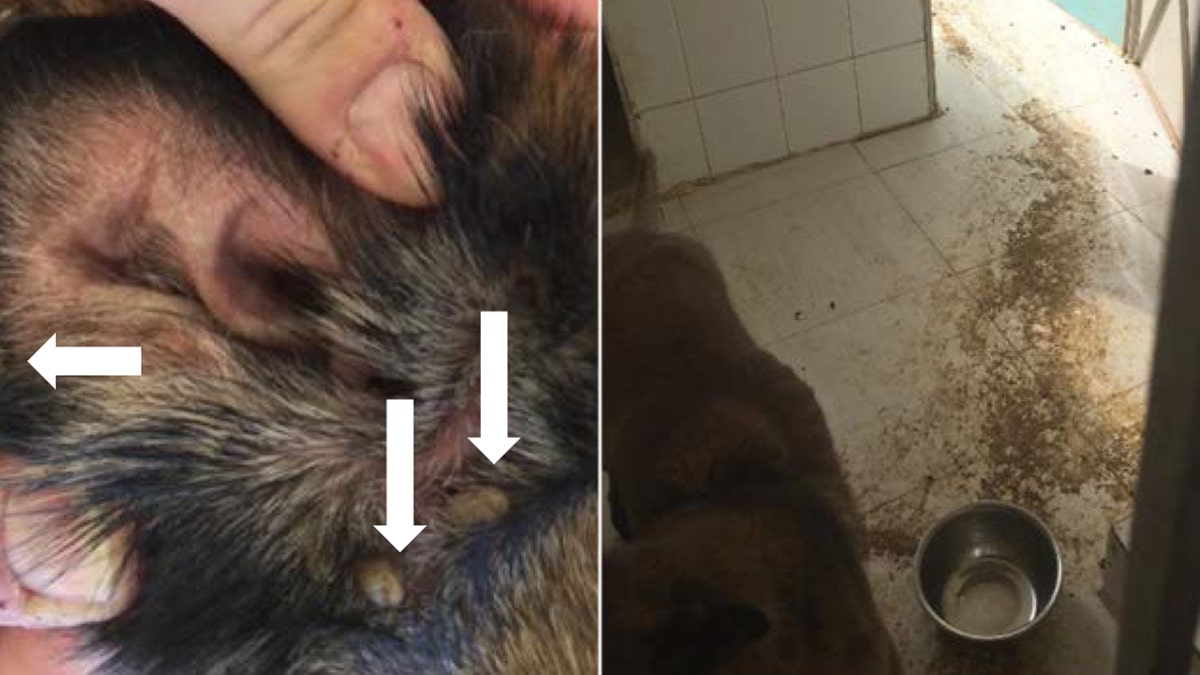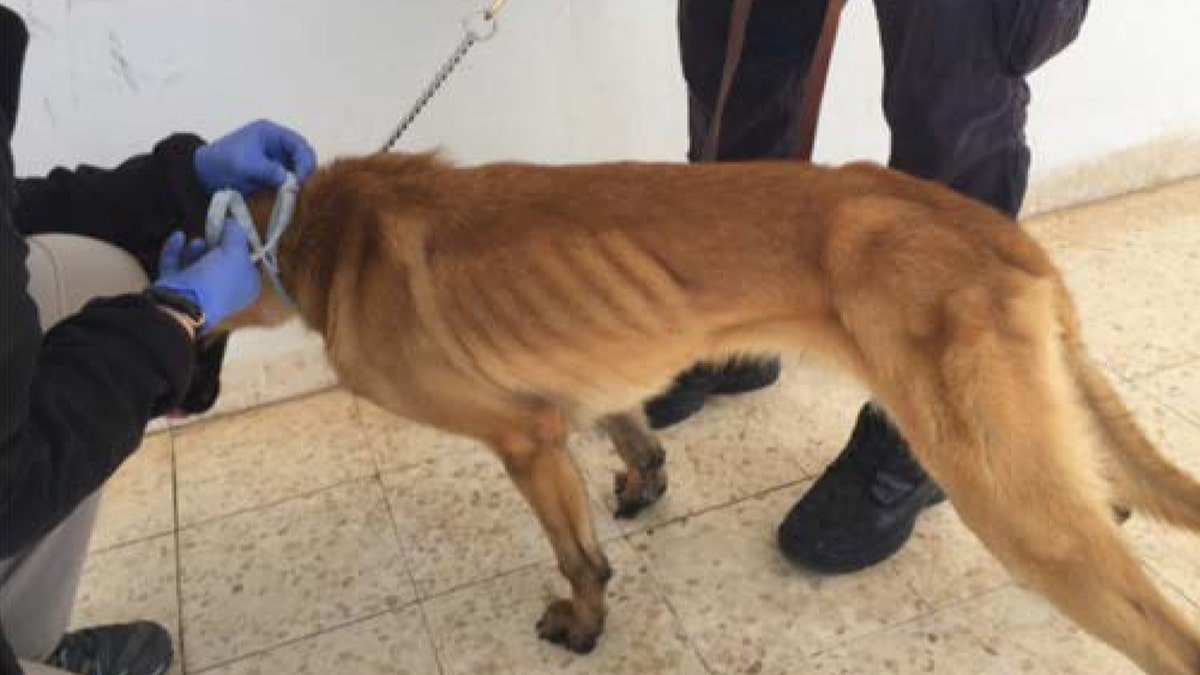Fox News Flash top headlines for Sept. 17
Fox News Flash top headlines for Sept. 17 are here. Check out what's clicking on Foxnews.com
At least 10 highly skilled explosive detection canines (EDCs) sent by the U.S. to Jordan have died from negligence and poor treatment between 2008 and 2016, and two more since then, while dozens of others live in "unhealthy conditions," a State Department Inspector General report revealed last week.
The State Department has known about the conditions since 2016, but still sent dozens of EDCs to the Middle Eastern country as part of its Explosive Detection Canine Program (EDCP), according to the report. Since August 2016, two dogs have died and one was returned to the U.S. in “grave condition," the inspector general said.

An explosive detection canine became infested with ticks (left), and another canine, Athena, lived in a kennel covered in dirt and feces, without fresh water (right). (U.S. State Department Office of Inspector General)
Zoe, a 2-year-old Belgian Malinois, died of heatstroke in July 2017 while working at the Syrian border. Then in February 2018, Mencey, a 3-year-old Malinois, was diagnosed with a tick-borne disease and returned to the U.S., where he was diagnosed with another vector-borne disease that caused renal failure, according to the IG. He was euthanized on March 29, 2018.
Athena, a 2-year-old Malinois who went to Jordan in May 2017, became emaciated within a year. She lived in a kennel covered in dirt and feces, and didn't have fresh water, the inspector general found. She was brought back to the U.S. in April 2018 and made a full recovery after receiving proper nourishment.

Athena, an explosive detection canine, was sent to Jordan but returned to the U.S. after less than a year after becoming emaciated and living in poor conditions. (U.S. State Department Office of Inspector General)
One canine died from vector-borne diseases and another of heatstroke. A third dog was severely malnourished, sent home to the program's Canine Validation Center (CVC) in Winchester, Va., and nursed back to health, the inspector general filing said.
The CVC sent a team in April 2016 to assess the dogs' conditions in Jordan after receiving a hotline complaint. The team discovered that the disease Parvo was rampant in the kennels, which was the cause of most of the deaths to date. An official said several dogs died from heat exhaustion. Subpar training conditions were also observed, as were at least 20 older dogs that should have been retired and “replaced immediately,” according to the IG report.

An underweight Jordanian canine (left) and a dog whose nails went severely untrimmed. (U.S. State Department Office of Inspector General)
“Several canines were observed to have hip dysplasia and obvious arthritis, and have lost the will to work,” the report states. “No motivational training is provided to support the canines.”

An underweight Jordanian canine. (U.S. State Department Office of Inspector General)
Even though the conditions have been known since 2016 -- and “little progress has been made” regarding Jordan's ability to take proper care of the canines -- the Bureau of Diplomatic Security's Office of Antiterrorism Assistance (DS/ATA) still sent 66 dogs to Jordan, according to the IG report.
IRANIAN CRUISE MISSILES AND DRONES USED IN SAUDI OIL FACILITIES, US OFFICIALS SAY
The inspector general's office spoke to five veterinarians who work or had worked for the CVC, and all “expressed concern with the health and welfare of the canines in Jordan,” with one saying the program “should have been shut down because of how badly the dogs were treated.”
“OIG confirmed ongoing concerns regarding the program in Jordan, where health and welfare problems have persisted for years. Nonetheless, the Department provided EDCs to this nation before those concerns were resolved,” the report concluded.
“Additionally, the Department did not adequately plan to ensure that Jordan’s canine program could become self-sustaining or that funding will be consistently available to protect the dogs already provided,” the OIG said. “Finally, the Department could not provide detailed information about dogs in programs other than Jordan."
TWIN SUICIDE BOMBINGS TARGET AFGHANISTAN PRESIDENTS' RALLY, KABUL DOWNTOWN; 48 DEAD
As of Sept. 30, 2018, 100 EDCs had been provided to six partner nations, and about 70 canines that had been provided under the Bureau of Alcohol, Tobacco and Firearms’ (ATF) program were active in seven nations.
“The Department routinely provides dogs to foreign partners without signed written agreements that outline standards for minimum care, retirement and use of the canines, and the Department conducts health and welfare follow-ups infrequently and inconsistently," the report stated.
The OIG recommended that the State Department cease sending dogs to Jordan “until there is a sustainability plan in place to ensure canine health and welfare." The department said it didn't agree with this recommendation, citing "national security-related efforts focused on protecting American interests" and because "assisting Jordan in combatting active terrorist threats would be negatively impacted by such a move," according to the report.
"The Department takes the results of this audit and the recommendations it contains very seriously. Canines play a critical role in our counterterrorism efforts overseas and in saving American lives," a State Department spokesperson told Fox News on Wednesday.
"Given prior incidents and the seriousness of the terrorist threat, we are cooperating with partner nations on these programs, particularly those nations that are a last point of departure for flights to the United States," the spokesperson said. "The strength of the program is dependent on healthy, well-cared-for animals."
CLICK HERE TO GET THE FOX NEWS APP
The inspector general also recommended the Bureau of Diplomatic Security develop written policies and procedures related to the canines' health and welfare, that the bureau develop a plan to address canine retirement, and that it create a written timeline for follow-up welfare checks on a regular basis. In addition, the bureaus of Counterterrorism and Diplomatic Security should jointly "develop and negotiate written agreements related to the canine program with partner nations that ensure there is a mutual understanding regarding the health, welfare and retirement of the provided canines," the report concludes.


